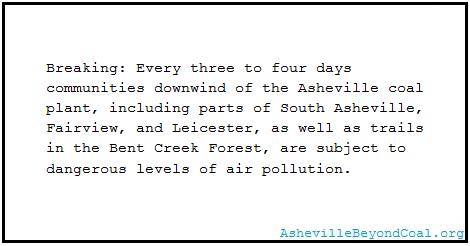An alarming report out Tuesday demonstrates that Duke Energy's Asheville coal plant has been emitting harmful sulfur dioxide (SO2) pollution at levels considered unsafe by the Environmental Protection Agency (EPA) for the past several years. Areas affected include parts of South Asheville, Fairview, and Leicester, as well as trails in the Bent Creek Forest.
The analysis by Air Resource Specialists shows that concentrations of sulfur dioxide in the air near people's homes downwind of the Asheville coal plant are up to 3.5 times higher than what EPA has determined to be safe. According to the study, the plant's pollution has exceeded these minimum public health standards approximately one out of every three to four days since 2010.
Add to that another sad fact: Nearly 20,000 children and adults suffer from asthma in Buncombe County.
"It is beyond my moral imagination that Duke Energy would permit this public health hazard to endanger our community," said Richard Fireman, M.D., retired Emergency Medicine Physician. "We know that air pollution from sulfur dioxide triggers asthma attacks and airway constriction. It exacerbates other respiratory problems including bronchitis and emphysema, requiring emergency medical treatment and hospital admissions. Sulfur dioxide can also form other toxic sulfur compounds that can aggravate existing heart disease, causing hospital admissions and unexpected, premature death."
Previously, watchdog groups have discovered dangerous pollution from the plant's coal ash pits, including mercury, leaking into the French Broad River in violation of the Clean Water Act. The plant is also the largest source of carbon pollution in Western North Carolina, making it the leading contributor to climate disruption in the region.
Also out Tuesday, news that Duke Energy will soon be facing up to $100 million in fines for Clean Water Act violation. But that's not the end of the company's woes regarding coal ash contamination:
A grand jury settlement won't affect state lawsuits over Duke's ash ponds or DENR's investigation of groundwater contamination, said Drew Elliot of the Department of Environment and Natural Resources.
"This is not some sort of global settlement," he said. "This is far from over."
From coal ash in the water to coal pollution in the air - how much more pollution will Duke Energy force on North Carolinians?
“While we've just learned about the extent and intensity of SO2 pollution in Asheville's air, Duke's coal plant has been a known source of pollution affecting our water and our climate for decades," said Kelly Martin, North Carolina representative for the Sierra Club's Beyond Coal campaign.
"It's time for Duke to take responsibility for this pollution and protect the health of our communities, not just some of the time, but all the time."
